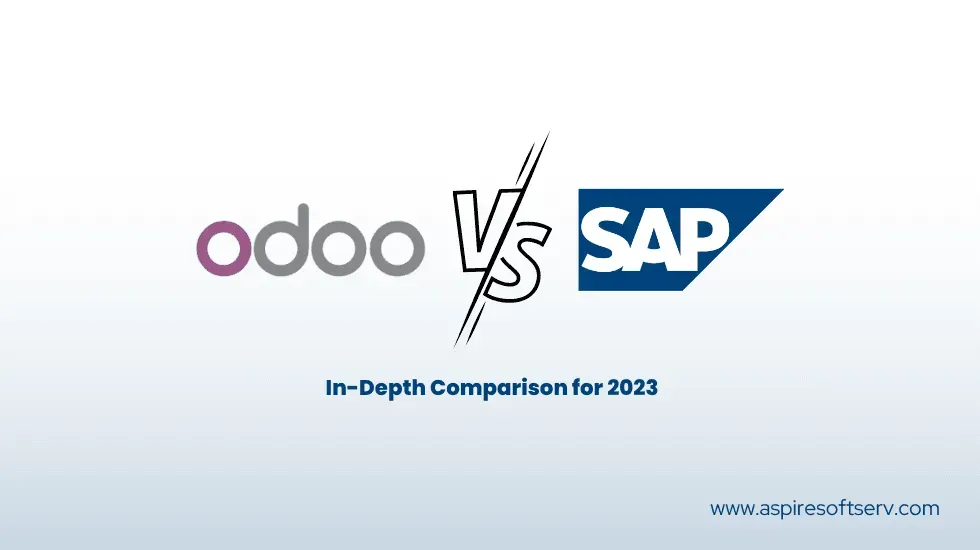
Introduction:
In enterprise resource planning (ERP) software, two heavyweights dominate the market: Odoo and SAP. Both platforms offer comprehensive solutions to help businesses streamline their operations, manage resources, and enhance productivity. As we enter 2023, let's take a closer look at Odoo and SAP, comparing their features, benefits, and suitability for different business needs.
Overview of Odoo:
Odoo ERP, an open-source platform, has garnered remarkable popularity in recent times. It distinguishes itself by offering a modular approach, empowering businesses to cherry-pick and seamlessly integrate specific modules tailored to their needs. At the heart of Odoo lies a robust suite of applications spanning sales, inventory, accounting, HR, and beyond. What sets Odoo apart is its flexibility and adaptability – a customizable solution that can be sculpted to fit the unique requirements of businesses, regardless of size.
In the realm of Odoo ERP customization , this platform stands out as a canvas awaiting the strokes of individual business needs. The open-source nature of Odoo gives rise to a vibrant, community-driven ecosystem, fostering regular updates and an extensive array of available modules. It's not merely an ERP; it's a dynamic, evolving solution that grows with your business, reflecting the beauty of customization that Odoo ERP brings to the table.
Overview of SAP:
SAP, a seasoned veteran in the ERP market, stands as a paragon of comprehensive and highly scalable solutions. Its impact reverberates particularly in the domains of large enterprises and multinational corporations, where its prowess shines. What sets SAP apart is its expansive suite of industry-specific modules encompassing finance, supply chain, manufacturing, human capital management, and customer relationship management.
In the intricate landscape of ERP, SAP's capabilities extend beyond mere functionality. It serves as a strategic ally, providing businesses with the flexibility to tailor their approach to specific needs. This adaptability is reflected not only in SAP's modular design but also in its commitment to keeping pace with evolving industry demands.
SAP's commitment to connectivity is another hallmark. Offering extensive integration capabilities, it acts as a unifying force, seamlessly connecting different SAP systems or bridging the gap with third-party applications. This interconnectedness lays the groundwork for a cohesive and efficient business ecosystem.
Amidst the wealth of features, SAP's reporting and analytics capabilities emerge as a game-changer. Businesses, armed with actionable insights, navigate the complex terrain of decision-making with newfound clarity. SAP becomes not just a system but a strategic partner, providing the tools and intelligence needed to steer towards success.
In essence, SAP is more than an ERP; it's a robust framework tailored to elevate business operations. Its enduring presence in the ERP landscape attests to its ability to evolve, adapt, and consistently deliver value to businesses on a global scale.
Read More: Odoo vs ERPNext: Choosing the Right ERP Solution for Your Business
Key Feature Comparison:
Customization and Flexibility: Odoo: Odoo's modular architecture allows businesses to select and customize modules based on their specific needs, offering high flexibility. SAP: SAP provides extensive customization options but may require more effort and resources due to its complex structure and enterprise-grade scalability.
Implementation and Deployment: Odoo: It's a user-friendly interface and intuitive design. Odoo offers a relatively straightforward implementation process. It is suitable for both cloud-based and on-premises deployment. SAP: SAP's implementation often involves a longer timeline due to its complexity and the need for extensive configuration. It is primarily designed for large-scale deployments and may require dedicated IT resources.
Cost: Odoo: As an open-source platform, Odoo offers a cost-effective solution, especially for small and medium-sized businesses. However, additional expenses for customization, support, and enterprise-level features may be incurred. SAP: SAP is known for its higher upfront costs, making it more suitable for larger enterprises with substantial budgets. Ongoing maintenance, licensing, and support costs should also be considered.
Industry-Specific Functionality: Odoo: While Odoo covers a broad range of industries, its industry-specific functionality may be less extensive than SAP. However, it can still be customized to meet specific industry requirements. SAP: SAP offers a wide array of industry-specific solutions, making it a preferred choice for businesses operating in complex sectors such as manufacturing, retail, healthcare, and finance.
Target Audience and Use Cases:
Odoo: Odoo caters to small and medium-sized businesses looking for a cost-effective and adaptable ERP solution. It is particularly suitable for startups or businesses that require flexibility and customization. SAP: SAP is well-suited for large enterprises with complex operational needs, extensive scalability requirements, and significant IT resources. Its industry-specific modules make it ideal for organizations with diverse business operations.
Read More: How Odoo ERP is the Best for SMEs:
Conclusion:
Choosing between Odoo and SAP in 2023 ultimately depends on your business's needs and resources. Odoo's flexibility, customization options, and cost-effectiveness make it attractive for small to medium-sized businesses. On the other hand, SAP's comprehensive functionality, scalability, and industry.
Boost your business efficiency with our expert Odoo ERP development services. Contact us today to streamline your operations and drive growth!



